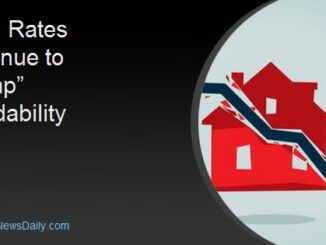
The Mortgage Bankers Association (MBA) announced on Wednesday a series of legislative recommendations, which it sent to the chairman and ranking member of the U.S. House of Representatives’ Financial Services Committee as the body considers the markup of proposed bills centered on real estate financing.
The first piece is House Joint Resolution 120, which would codify congressional disapproval of a rule submitted by the Financial Stability Oversight Council (FSOC) at the U.S. Department of the Treasury that would provide a designation framework for classifying nonbank financial entities as systemically important financial institutions, without making any conclusions or designations.
MBA has consistently opposed such a measure, with president and CEO Bob Broeksmit saying at a conference in Washington, D.C., last year that it would “be a major regulatory power grab over a part of the housing finance market that is already well-regulated by the states and other federal agencies.”
MBA recommends voting for this resolution, which is primarily sponsored by Rep. French Hill (R-Ark.) and co-sponsored by nine of his Republican colleagues.
“MBA believes that FSOC should be compelled to conduct a deep and thorough analysis, including weighing the cost and benefit of such a designation to the U.S. financial system as a whole — and the likelihood the financial company in question will experience material financial distress as a result of the designation,” MBA said in its letter.
The second piece is House Resolution 5535, also known as the Insurance Data Protection Act. It would “prohibit the Federal Insurance Office of the Department of the Treasury and other financial regulators from collecting data directly from an insurance company,” according to the text of the bill.
MBA also supports this measure, its letter said.
“The legislation, as written, would protect consumer data, preserve the role of the states as the primary regulator of the insurance business, and reduce administrative costs for our association’s life insurance company members involved in commercial real estate finance activities,” the letter read.
Sponsored by Rep. Scott Fitzgerald (R-Wis.), the bill is also uniformly supported by Republicans and features 25 co-sponsors.
Lastly, H.R. 802, known as the Respect State Housing Laws Act, would “amend the CARES Act to remove a requirement on lessors to provide notice to vacate” among other purposes, according to the bill’s text.
The Coronavirus Aid, Relief and Economic Security (CARES) Act was passed in the immediate aftermath of the COVID-19 pandemic declaration in March 2020 and signed into law late that month by then-President Donald Trump. H.R. 802 would eliminate “a provision from the CARES Act that requires a 30-day notice period before a landlord may begin eviction proceedings against a tenant in federally assisted or federally backed housing,” according to MBA’s letter.
MBA also supports this measure, saying that the 30-day notice period “was meant to be temporary, creates an unnecessary federal interference under state law, and has subjected housing operators to significant operational hurdles and financial strain,” the letter explained.
This measure is the only one of the three, technically, to feature bipartisan support. Sponsored by Rep. Barry Loudermilk (R-Ga.), the bill features 31 Republican co-sponsors and one Democratic co-sponsor, Rep. Vicente Gonzalez of Texas.



